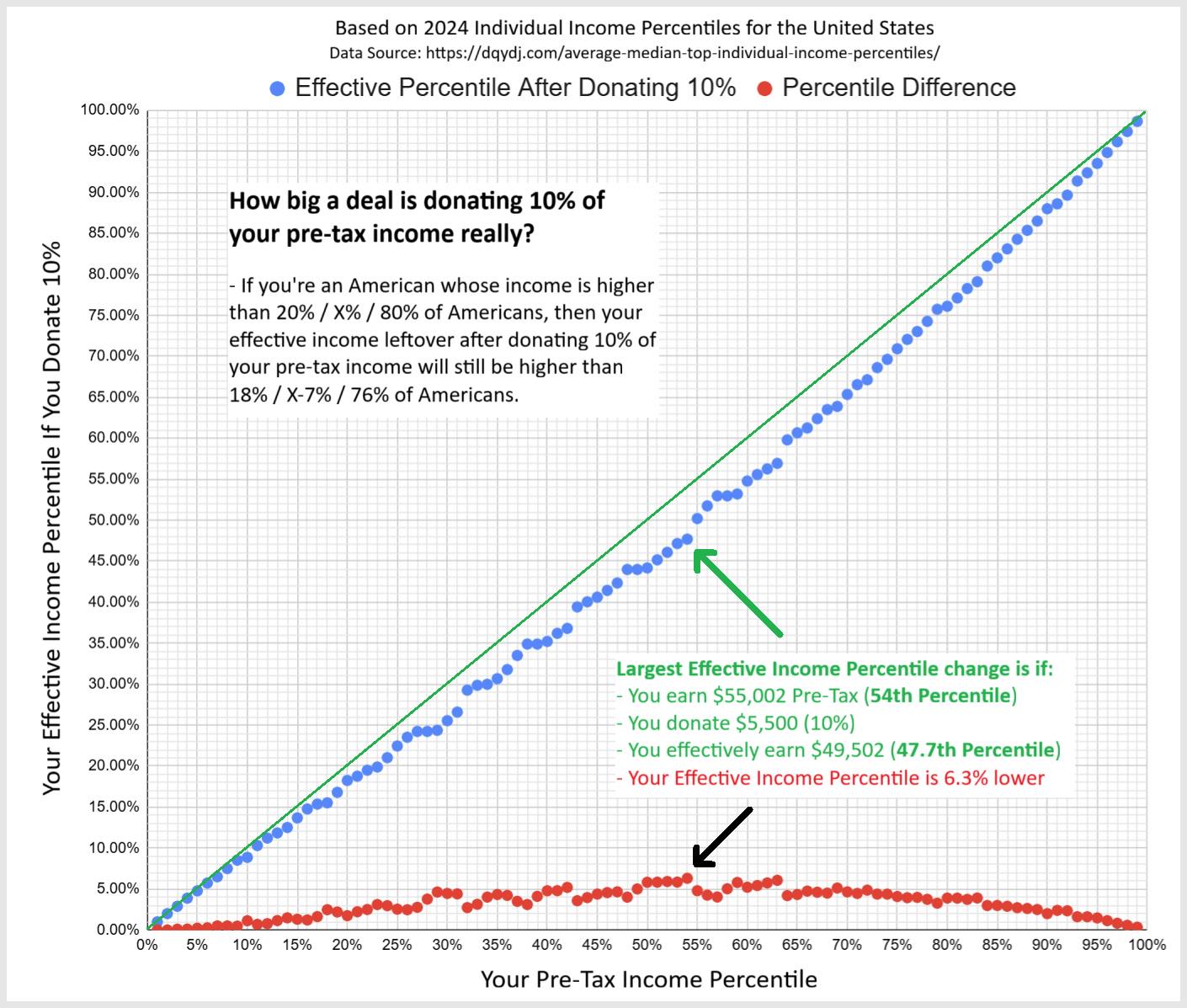
Why 10%?
Because that's the number of the 10% Pledge. No other reason.
How big a deal is donating 10% of your pre-tax income really?
On the one hand, 10% of one's income feels like a lot of money no matter how much you make. But on the other hand, incomes vary tremendously such that no matter how much you make, giving away 10% of your income won't change your relative income rank by much.
If you're an American who income is higher than 20% / X% / 80% of Americans, then your effective income leftover after donating 10% of your pre-tax income will still be higher than 18% / X-7% / 76% of Americans.
In the US, donating 10% at most lowers your income percentile by 6.3 percentile from 54th percentile to 47.7th percentile, requiring you to live on $49,500 instead of $55,000.
So from this perspective at least, it's clear that donating 10% is not that a big a deal.
Yet, of course, your 10% can be a huge deal to the world or the recipients of your charity.
An old related memory
On Giving Tuesday, November 27, 2018, Facebook hosted a counterfactual donation match in which they gave away $7 million to the nonprofits users donated to on a first-come, first-serve basis with some limits. Hundreds of EAs participated and collectively we directed about $469,000 in Facebook's matching funds to our preferred EA nonprofits that year.
That night, I was at a friend's house for dinner with several other friends. In the course of relaying the story of how the match went (there were a fair amount of logistics), it came up how much I personally donated. One friend asked "Why'd you need to make eight separate donations?" and I explained (paraphrasing) "Facebook had a size limit on donations of $2,500, but an individual match limit of $20k, so in order to get the maximum match amount you had to make eight separate donations."
I was in my early 20s and this was a lot of money for me and well over 10% of my income for the year, but I was excited to take advantage of the matching opportunity while it existed. (Later I found out that I got all $20k matched.) So my friend was like "You donated $20,000?" and I was like "Yeah," and then he said "Wow, that's a lot" or something in a way that led to awkward silence in which I wasn't quite sure what to say (or so my memory goes).
His reaction and what I thought to myself next is what sticks in my memory. Something about his tone made me feel like he was judging me. If I had said I had bought a car for $20,000, he certainly wouldn't have reacted "Wow, that's a lot of money." It was clear he was thinking that it was a lot of money to give away.
I recall thinking to myself that yes, it's a lot of money, but also, he's a software engineer who probably makes over twice as much money as me, so is it really a lot of money to donate? He could donate that much and still have much more remaining income that year than I earned pre-tax. Also, at least one other friend at the table made less money than me even after subtracting the amount I donated. So in the grand scheme of things, it's not like it was a big sacrifice or anything. It just meant I'd have less savings in my bank account. To me, it seemed like a perfectly reasonable amount of money for me to donate, but I didn't have the words to articulate why at the time and just felt awkward.
Better versions of this chart
I hadn't seen a chart like this before despite thinking of the idea of it several times over the years, so I decided to just make one. If you feel like making a better version than my MS Paint image, share it in the comments! Here's the data I used. It may also be cool to plot the values for donating e.g. 20%, 30%, 50% on the same chart.

Hi William. James from the Giving What We Can team. Thanks so much for sharing this!
I think exactly this asymmetry is what makes the pledge so compelling: small adjustments in our own comfort can translate into massive gains in wellbeing, health, and opportunity for others. It's quite starling to have it show like this.
I also relate with the donation story. I recently told my friends I was approaching £50,000 in donations and their response was pretty much stunned silence. But then I broke it down for them and explained that it was spread over 5 years, (some which I'd be living abroad and had very low living costs) and it prompted a great discussion. I also told them the truth: that I get far more satisfaction from the 10% I give away than I do from any other spending. Two of them went away telling me they'd consider pledging themselves.
Obviously each case is different, but I'd definitely encourage you to keep having these conversations. You're doing an amazing thing!
Thanks for the analysis, William! I had also thought about this. I am glad you took the time to illustrate it with a graph.
For me, the foundational question is "How much is enough?" How much do I need to live a reasonably healthy, happy life? Kahneman & Deaton (2010) found this to be $75,000, which would be about $100k in 2025. I use this as my baseline (adjusted for the cost of living in my area). Maybe this will help others contextualize.